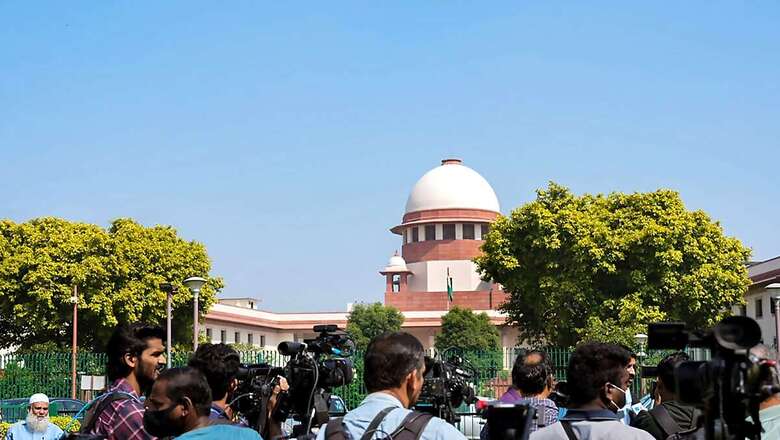
views
A senior Congress leader recently took a jibe at the central vista redevelopment plan and the construction of the new Parliament building, terming it a ‘vanity’ project of Prime Minster Narendra Modi.
The political controversy is not new and even a Supreme Court order giving the project a go-ahead could not put an end to it. The central vista is not the only case in point. The purchase of Rafale planes, the Pegasus snooping scandal and the Adani saga have all knocked at the doors of the Supreme Court. Judicial orders, committees and their reports have not settled the political debate conclusively.
Many would argue that courts are not supposed to settle questions of policy. Judicial pronouncements cannot decide whether a policy is good or bad. The elected government has the discretion to decide on whether a certain expenditure needs to be undertaken, whether a defence spending is feasible in national interest or can the country afford a new Parliament building. These are questions of public policy that cannot be settled by a court of law.
Nevertheless, the courts have attempted to tread on this territory. The orders of the Supreme Court are used as ammunition in political narrative depending on whose argument they suit.
In the last few years, a trend has emerged where any high-profile political controversy pertaining to a policy issue is taken to the doors of the Supreme Court, irrespective of whether the issue is worth adjudication. Any ‘concerned citizen’ can file a public interest litigation which may lead to the intervention of the Supreme Court. In most of these cases, the question is not of any largescale illegality, but is often about often vague constructs of propriety that the courts have dealt with.
These litigations are a reminder of the time when the Bofors scandal rocked the nation in the late 1980s. Ironically, the opposition, especially the Congress, might be looking for its ‘Bofors moment’ now. The Bofors scandal pertained to allegations of corruption and kickbacks in a major defence deal. The scandal came with huge political costs to Rajiv Gandhi and his government, but never resulted in any high-profile conviction. The perception of large-scale corruption and the alleged involvement of Rajiv Gandhi was a political indictment of sorts.
Times have changed and political perception is far more clinically managed. The central vista project is linked to ‘national pride’ in the political narrative. Pegasus emerged as an issue that only concerned the political or intellectual elites and failed to resonate on the ground. The judiciary hardly had any role to play in these issues.
Unlike Quattrocchi in Bofors, there was no face in the alleged Rafale scandal that the opposition could go to town with.
The Supreme Court gave a green signal to the deal on the limited aspects that were brought before it. The ammunition for building a political perception against the government that the Opposition is looking for has not come from the courts so far. All attempts have been a dampener. In fact, on critical issues, judicial orders have worked in the favour of the government.
Courts cannot and should not do the job of creating and mobilising political perceptions.
Many argue that perhaps courts should not take up such issues. That indeed is an afterthought because the result does not suit the narrative of the losing side. It’s a double whammy for the courts. The courts would be damned if they refuse to take up a central vista or a Pegasus case, and are questioned even when they do.
The Supreme Court made an earnest attempt to deal with the Pegasus controversy, but barely few individuals submitted their phones for examination. All eyes are on the Supreme Court committee set up post the Adani controversy and what kind of regulatory recommendations it can come up with. Nothing stops the government or any other agency from launching a parallel investigation or enquiry.
Constitutional courts play a crucial political role in India or any other democracy. The courts are looked upon to check the excesses of a strong executive and restore the balance. The hunt for a ‘perfect corruption scandal’ will lead the opposition parties to the High Courts and Supreme Court very often.
In election season, the courts have a tricky and crucial role to play. But the judiciary shall play its own role of upholding the rule of law and cannot do the work of the Opposition.
Read all the Latest India News here

















Comments
0 comment